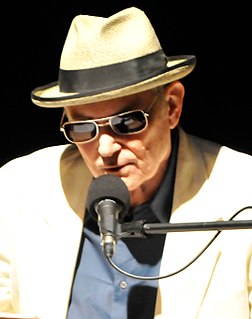A Quote by Charles Nelson Reilly
If you're entering a room for the first time, do it the way you would in life - look around; see how they have the furniture arranged. If your character is meeting another character for the first time, meet them the way you would in life.
Related Quotes
When I'm writing, I try to have the mask of my character on as I'm walking through the world. When I'm not at my desk, the rest of the time, I try to stay in that character and see the world the way that character would It's almost like method acting in a way — keeping the character close the way the actor keeps a script close and always tries to be in character.
When I went to the University of Iowa in order to be a writer, I thought, This is the worst way to learn how to write. To sit in a room with a bunch of would-be writers, who want to write the Great American Novel, every one of them, and you read their stories and they read yours, and you're not living a life. I don't like that. I like learning on the job. The character of my work has definitely evolved from the character of my life.
Life as a performance is just a way to look at life choices as character choices. Every morning you choose what to wear, you choose how to wear your hair, you choose your friends, you more or less choose your profession, and how hard you will work at it. Those are all things that an actor decides about his character when he is performing, and they are things that we decide in life. We create our "character."
My idea was you can't dress for the stage, you have to dress all the time like you're onstage. And so I would just always wear suits or some form of it. I wanted people to know I played music. That was kind of how you would find other people: you would just walk around looking a certain way and end up meeting someone who liked the way you look.
As a kid, I was a big reader. Books and theater were the way I understood the world, and also the way I organized my sense of morality, of how to live a good life. I would read all night. My mom would come into my room and tell me I had to go to sleep, so I would hide books under my bed. At first I had a tough time getting through novels, so I read plays, because a play is generally shorter and has all those tools for getting people hooked early on.
Perhaps I could best describe my experience of doing mathematics in terms of entering a dark mansion. You go into the first room and it's dark, completely dark. You stumble around, bumping into the furniture. Gradually, you learn where each piece of furniture is. And finally, after six months or so, you find the light switch and turn it on. Suddenly, it's all illuminated and you can see exactly where you were. Then you enter the next dark room.
Working in television it's really great to be able to stick with a character for a long period of time. It's not like you have one shot, and that's it. You have more time, more room, an ability to reflect on your performance and the character and how much has really been shown, and what you'd like to see. It's nice. You have more breathing room.
At the time, I used to say, "We should market this like Everybody Loves Raymond. It's just a guy dealing with his family." Instead, it was irresistible to show all these funny people. So, I actually think this could be more inviting to a new audience because they can just watch one character, find out what's going on in his life, and then meet another character and find out what's going on in her life, and then see how it intersects the other one.
The (Sir Arthur Conan Doyle) stories were great, for one. The thing that makes him a remarkable character is how he can withstand all of these different interpretations and different styles and, that's what makes a classic character a classic character; they keep coming back and you see them in a new way every time.




































